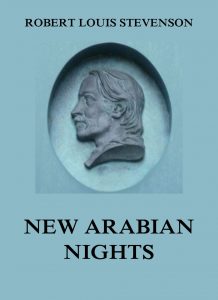New Arabian Nights – Robert Louis Stevenson
Stevenson’s title for these tales of imagination clearly shows what he intended their character to be. Plainly they were not meant to be realistic. Their stilted, artificial style is out of keeping with such an object. They were evidently to be stories which are entertaining in the same way that the “Arabian Nights” is entertaining, with just as little pretence of realism. As a child in his grandfather’s manse at Colinton he had devoured the eastern tales; the New Arabian Nights, written when he was twenty-eight, are a special form of literary invention which came easily from Stevenson’s habit of investing the most ordinary places and people with the wildest romance. The stories are peculiar in that their artificial style leaves one ungripped by the horror of adventure, such as those of The Suicide Club. But the artificiality was clearly deliberate; when he wanted, no one better than Stevenson could write tales of horror to make the flesh creep. He did in fact project a series of this kind, of which only one or two were completed. But in the New Arabian Nights it is easy to see his precise aim at a lighter effect. No doubt the pleasure in the technical problem — at once Stevenson’s curse, and the source of his unequalled prose — prompted this experiment.

New Arabian Nights
Format: Paperback.
New Arabian Nights.
ISBN: 9783849675912.
Available at amazon.com and other venues.
Biography of Robert Louis Stevenson (from Wikipedia):
Robert Louis Balfour Stevenson (13 November 1850 – 3 December 1894) was a Scottish novelist, poet, essayist, and travel writer. His most famous works are Treasure Island, Kidnapped, Strange Case of Dr Jekyll and Mr Hyde, and A Child’s Garden of Verses.
A literary celebrity during his lifetime, Stevenson now ranks as the 26th most translated author in the world. His works have been admired by many other writers, including Jorge Luis Borges, Bertolt Brecht, Marcel Proust, Arthur Conan Doyle, Henry James, Cesare Pavese, Emilio Salgari, Ernest Hemingway, Rudyard Kipling, Jack London, Vladimir Nabokov, J. M. Barrie, and G. K. Chesterton, who said of him that he “seemed to pick the right word up on the point of his pen, like a man playing spillikins”.
(The text of the last section was taken from a Wikipedia entry and is available under the Creative Commons Attribution-ShareAlike License.)
Publisher’s Note: This book is printed and distributed by Createspace a DBA of On-Demand Publishing LLC and is typically not available anywhere else than in stores owned and operated by Amazon or Createspace.
